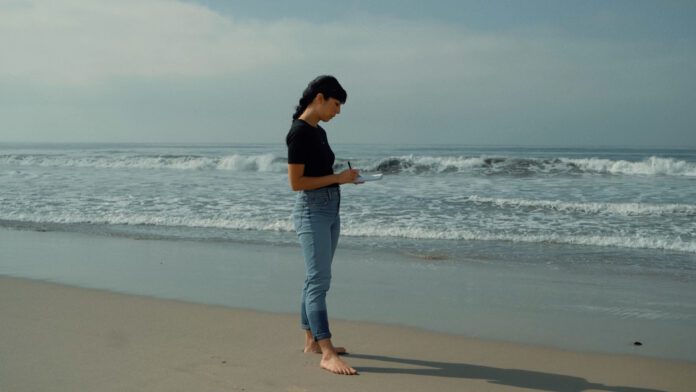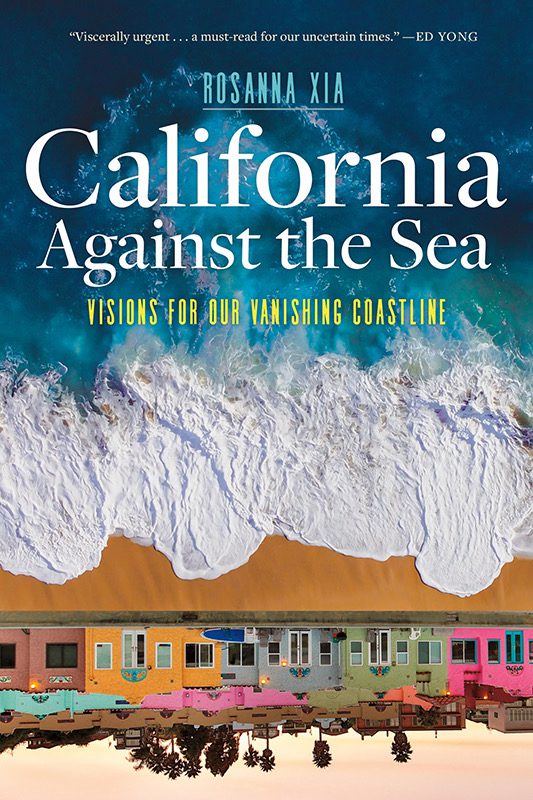
Students, community members enjoy instructive, insightful conversation with environmental reporter Rosanna Xia
By Barbara Burke
Special to The Malibu Times
Malibuites of all ages thoroughly enjoyed joining Pepperdine students at the university’s 8th Annual Climate Calling Conference showcasing a special Earth Month Malibu Library Speaker Series on April 11 that featured Los Angeles Times environmental reporter Rosanna Xia, who discussed her explorations, discoveries, and writing about climate change in coastal California.
Xia, a brilliant, experienced journalist who is blessed with the enviable and invaluable ability to distill difficult scientific concepts into comprehensible terms for readers, discussed her career at the newspaper, her observations of diverse climatic changes along California’s 1,200-mile coast line, her recent award-winning nonfiction work, “California Against the Sea: Visions for Our Vanishing Coastline” (Heyday Books), and her perceptions about mankind’s precarious, but not impotent, position concerning complicated options for responding to and dealing with mother ocean’s encroaching on valuable land and infrastructure along California’s coast.
“We can’t solve the climate crisis if we don’t know the problems of the past,” Xia matter-of-factly stated, noting that her writing often delves into the history of how indigenous peoples grappled with and accommodated the realities attributable to a changing coastline. She then commented that “knowledge is the beginning of action and action is the end result of knowledge.”
Xia exhaustively researches all applicable historical records, relevant data, scholarship, and experts’ debates before penning a piece. Ever attentive to demographics, scientific facts, and studies, and after exhaustively interviewing experts and stakeholders involved in various coastal communities’ grappling with how to respond to and adapt to sea level rise, she writes about innumerable permutations regarding what options are available to individuals and groups of people in general, and to governmental policy makers in particular.

Xia was a Pulitzer Prize finalist in 2020 for explanatory reporting, and her book has been anthologized in the Best American Science and Nature Writing series. Readers may enjoy reading an excerpt that the Los Angeles Times published, and the book review by Science, which ably captures the work’s range, themes, and tone. The book also recently won the Golden Poppy Award for nonfiction, which is an award voted on by more than 230 independent bookstores and booksellers in California, and the California Book Awards just named it a finalist for the nonfiction category — the winners of each category will be announced next month.
In her presentation at Pepperdine, as well as in her news writings and book, Xia considers what the future holds for California’s coast and its inhabitants, comprehensively evaluating humanity’s seemingly innumerable potential reactions to climatic changes. In doing so, she hovers delicately but deliberately at the complex intersections of climatic realities, response opportunities, and potential solutions.
Xia is brilliantly and intuitively mindful that in the context of in the context of rising waters and changing coastlines, to some extent, humanity is precariously close to manifesting the potential risks underlying the tragedy of the commons theory, a principle that refers to a situation in which individuals with access to a public resource, also called a commons — in this instance, California’s coastline — act in their own best interest and, in doing so, risk ultimately depleting or destroying resources. The complicated conversations her article and book address concern interrelationships between politics and economics, science and emotions, and individual and collective choices.
Her central thesis is perhaps best encapsulated by a simple, yet telling passage near the beginning in her book when she discusses visiting 20 different coastal towns along California’s diverse, extensive coastline and speaking with stakeholders in each location.
“The more I listened, the more this book evolved. My own understanding of land, of permanence, of our duty to each other has expanded since I first considered our relationship with the shore. There exists more than one way to live with rising water, but our current understanding of what the coast should be has overshadowed the possibilities of what it could be.”
A consummate bottom-liner, Xia notes that humanity is at an inflection point relative to coastal sea rise, and that we “are the first generation to feel the consequences of a warming planet and the last generation that can steer a different course.” The book, her Pepperdine presentation and her articles focus on explaining the dynamics involved with each climate change challenge and center on the potential and necessity for humans to focus on our capacity to change.
Xia does not shy away from — rather she engages head-on with — complex possible solutions to addressing sea-level rise, such as managed retreat. In so doing, Xia posits that instead of being at war with and trying to manage coastal changes and climate change, Californians embrace such dynamics as “an opportunity to heal, to care for, and to love this one Earth that is ours.” Readers who assume that Xia is a Polyanna who unrealistically embraces an impossible-to-attain panacea risk missing her central brilliance — she points out that there are various possible solutions to the climate crisis.
In doing so, she is comprehensive and visionary, as evidenced by the fact that she engaged her audience in brilliant colloquy after completing her presentation.
Adults who long ago begrudgingly emerged from the inspiring incubator of academic colloquy delved into some of her recent articles. For instance, long-time non-violent environmental activist Malibuite Valerie Sklarevsky wanted to discuss Xie’s recent article discussing the dumping of radioactive material off the coast of coastal California decades ago,
“I’m an old lady now and for years, I’ve protested the dumping of nuclear waste off the shores of Southern California,” Sklarevsky stated, handing out a Malibu Times article from April 22, 1992, titled “Non-violent activist takes responsibility for protests” that recounted her various protestations against such environmental pollution. As if to say that her decades-long campaign against radioactive waste has been given voice anew, Sklarevsky stated she was heartened by the younger audience members being so attentive and engaged with Xia’s discussion concerning such investigations.
Eager college students aspiring to be journalists or environmental scientists, or both, explored process and technique with Xia, asking her about her tone when addressing the climate change conundrum.
“How much hope for the future should be incorporated into an article?” is a question Xia grapples with when writing her pieces.
“If I end an article implying that there is no hope to solve an issue, that leads to ‘nowism’ and passivity,” Xia said, noting that she strives to strike a realistic balance between climatic challenges and possible solutions. Ultimately, she observed that, “The climate crisis is also a crisis of culture,” a crisis we all need to address.
The conversation ended much too soon in many attendees’ minds. However, the narratives that Xia engendered and inspired will endure as attendees left very mindful of one of Xia’s concluding postulations: “We are running out of time, but we still have time to make a difference.”
